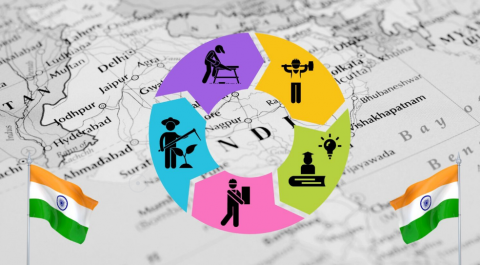Introduction to the Skill Landscape of India
The skill landscape of India can be traced back to centuries including different artists from all fields. Skill development refers to the process of acquiring and improving specific skills, and knowledge. These skills are necessary to perform a particular job or task effectively and . It involves a range of activities and interventions, including education, training, apprenticeships, and on-the-job learning. It enables individuals to acquire the skills and knowledge needed to succeed in the workplace.
Skill development is important because it helps individuals improve their employability and job performance. It also enables them to adapt to changing job requirements and technological advancements. For businesses, skill development is very crucial in the growth of the company. They need to ensure that their workforce has the necessary skills to perform their jobs effectively. Also, businesses need to assess the skill to increase productivity, and remain competitive in the market.
Types of Skill Development
Skill development can take various forms, depending on the specific needs of the individual or the organization. It may involve formal education, such as a degree or diploma program, or more practical training programs, such as apprenticeships or on-the-job training. Skill development may also involve the use of technology, such as online learning platforms, to provide training and upskilling opportunities to individuals.
Overall, skill development is a critical component of individual and economic growth, and plays a vital role in shaping the future of work.

History of Skill development in India:
The history of skill development landscape in India can be traced back to the pre-independence era. Before independence, the skill development landscape in India was shaped by various factors. It includes traditional artisan practices, vocational training initiatives, industrialization and the influence of colonial policies.
Here is a brief note on the skill development landscape in India before independence:
Colonial Policies:
The British administration aimed to develop a workforce that could support their colonial governance and serve their economic interests. They introduced policies and initiatives to impart skills that aligned with the needs of the British administration and industries. The British introduced modern education systems and vocational training programs to produce a class of Indians who could assist in administrative and technical roles under colonial governance.
Western Education System:
The British introduced a formal education system in India based on Western models. English-medium schools and colleges were established, focusing on subjects such as mathematics, sciences, humanities, and languages. This education system laid the foundation for a structured approach to education and skill development.
Vocational Training Initiatives:
The British administration recognised the need for vocational skills to support industrial growth and infrastructure development. They established technical institutions and vocational training programs to impart skills in engineering, agriculture, healthcare, and administration.
Industrial Training Institutes (ITIs):
The British introduced Industrial Training Institutes (ITIs) to provide vocational training in various trades and crafts. ITIs offered practical training in skills like carpentry, blacksmithing, metalwork, and other technical fields to cater to the needs of emerging industries.
Technical Education Reforms:
They formed several committees and commissions to assess and recommend improvements in technical education. Notable examples include the Indian Factories Act and the Technical Education Committee, which aimed to enhance technical skills and ensure better working conditions.
Traditional Skills and Artisans:
India had a rich heritage of traditional artisan practices that involved intricate craftsmanship and specialised skills. Artisans passed down their skills through generations, maintaining a unique skill ecosystem. It encompassed various crafts such as weaving, metalwork, pottery, woodworking, and more. Despite the focus on Western education and vocational training, traditional skills and craftsmanship continued to be significant. Although the growth of industrialisation affected some traditional occupations.
Influence of Missionaries:
Christian missionaries played a significant role in education and skill development during the British era. They established schools, vocational training centres, and missions, contributing to the spread of education and the acquisition of skills among local communities.
Focus on English Education:
The British colonial administration gave priority to English education, focusing on producing a class of Indians proficient in English and Western knowledge. English-medium schools and colleges were established, which laid the foundation for modern education in India.
Gurukul System:
The Gurukul system of education played a significant role in skill development before independence. Students lived with gurus (teachers) and learned various skills through practical training and hands-on experience. This system primarily focused on imparting knowledge and skills in fields such as medicine, architecture, warfare, and philosophy.
Conclusion
During the British era in India, the skill development landscape underwent significant changes influenced by colonial policies and the emerging industrialisation.
The skill development landscape during the British era reflected the influence of Western education, Gurukul education, vocational training initiatives, and the preservation of traditional artisan practices. Western education and vocational training gained prominence and influenced the aspirations of individuals. But on other hand, traditional skills continued to play significant roles in various sector, contributing skill ecosystem in colonial India.
Click this link to know more about importance of skilling in the apparel industry


Leave a Comment